Eighteen years ago, I sat in a meeting room, totally unaware of the mind games called negative thought patterns—those nagging, recurring, unhelpful thoughts that undermine our confidence and decision-making.
Post-meeting, as I drove back, I mildly hit a mini-truck after jumping a red light.
Why? My brain was too caught up replaying every giggle and muttered comment from the meeting.
The only casualty, thankfully, was my ego—which was a far beyond Band-Aid repair.
Armed with today’s wisdom, I can tell you—those were negative thought patterns hijacking my attention from the road.
I was unhurt physically, but my mind dragged me through a self-sabotage mudfest.
It was like having an inner critic on steroids, constantly mocking how I acted, branding me an unsophisticated ‘village girl’ out of her element in this glitzy, sophisticated snow-laden city on the East coast of USA.
Sound familiar?
Since then, I have had my fair share of adventures where these unhelpful subconscious patterns took the wheel, metaphorically and literally—not always ending in vehicular mishaps, but definitely causing some heartaches and face-palm moments.
But then, my guardian angel was always active too- as active as the nay-sayer inside was.
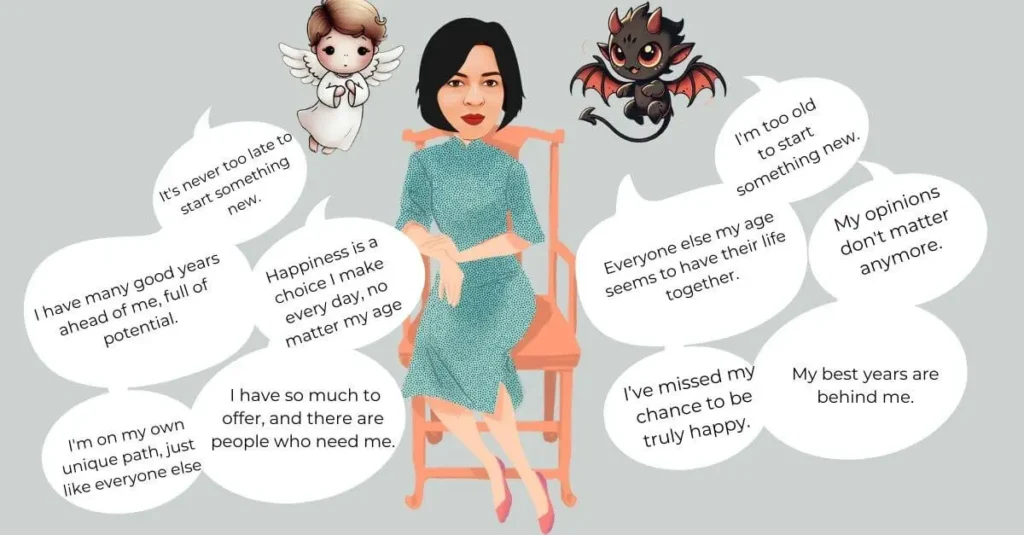
I have always been intrigued by how the mind worked.
I remember borrowing a video tape from the library in 2004-or 2005 that said- “what the fuck do you know.?”
It talked a great deal how how mind worked, how neurons fires and how neural pathways are formed.
Back in 2014, I took a course in neuro linguistic programming – that talked about how words impact and can train brain.
So one of my major midlife goals is to work on my personal growth like I am under an “oath.”
P.S. Brace yourself.
I am about to dive into the “whys” of these brain games those psychologists call negative thought patterns.
The “Not-So-Scary” Science of Negative Thoughts
I never liked science in school, especially when it came to cramming for exams just to scrawl answers that might wrestle up an A—though I was more of a C student by choice.
School never taught me how to quiet the nagging voice in my head.
In fact, every test, quiz, and report felt like another chance for them to crank up that voice in my head, yelling, “you are not getting this, are you, dumbhead?”
“You are not good enough.”
Schools are not equipped to teach mental wellness. That is a responsibility that you have to take when you are thrown into the real world.
So, after several courses and books, I began learning to manage the nagging voice in my mind.
Turns out, the way to deal with the negative thought patterns is- you can simply tame it, starve it, and make it lose its power over you. And that should be the aim. It never really dies.
Know thy enemy – the negative thought patterns
Understanding Our Brain’s Bias
When I discovered that our brains are wired to prioritise negative thoughts—a survival mechanism from our caveman days—I thought, “Great, even Mother Nature thinks it’s funny to mess with us.”
We are out to make a move that matters to us, one thought emerges and it stops us in the track.
“What if it rains?”
“I will surely fail at this.”
“It is no use to ask her, she will refuse.”
Our brain is built with a negative bias which means we are more likely to focus on negative outcomes or threats.
Let me repeat this in a more catchy and memorable way- you ought to remember this-
OUR BRAIN IS BUILT WITH A NEGATIVE TILT
The Evolutionary Role of Negativity
That trait came in handy when there were real-life threats around us when we were cave-people wearing leaves and no shoes, battling weather, rough terrains, and fire-spitting dragons!
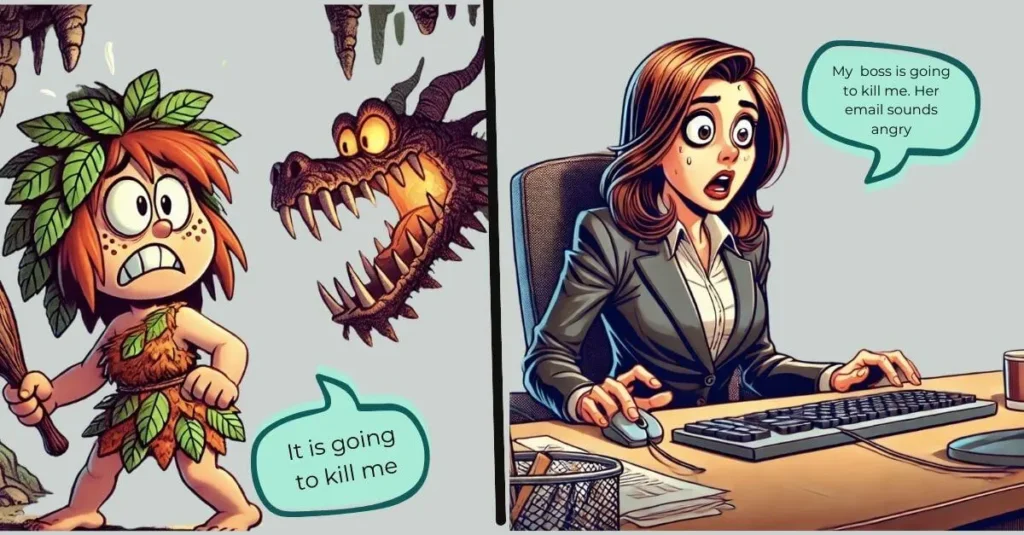
Back in the day, our ancestors needed that negativity bias just to dodge dinosaurs and avoid eating poisonous berries. So technically, negative thought patterns saved their lives.
But now?
That same bias has us sweating over an email’s tone or a colleague’s casual side-eye.
While we can’t trade in our brain’s ancient hardware, we certainly can update its software.
Rewriting the Mental Script
Every time you replay a negative thought, you are basically paving a smooth path in your brain, making it the go-to route whenever things get tough.
You know that saying,
“Neurons that fire together, wire together”?
With repetition these negative thoughts become the stronger and they start running on autopilot.
After years of this, we have all got a mix of good habits and some real duds hardwired in there.
The tricky part?
Figuring out which habits to keep around and which ones to kick to the curb.
How the brain pushes us to behave a certain way.
Thoughts feed feelings or feelings generate thoughts—it’s like the old “chicken or egg” conundrum.
So, what is really calling the shots?
Emotional Intelligence tells you to focus on emotions.
NLP tells you to focus on words.
The goal for both is the same – to break the negative thought patterns.
Here is what I experimented with-
Pay attention to what you are thinking and notice how it makes you feel.
Then do the reverse—what are you feeling, and what thoughts are popping up because of it?
If your thoughts are on the right track, you will start feeling better, which motivates you to take positive actions. And when you feel good, those positive actions just keep building up.
Take a look at these tables, and you will see how it all fits together—no rocket science, just a simple pattern that works.
Table 1- Good thoughts leading to good feelings and growth inducing actions.
Table 2- Good thoughts leading to good feelings and growth inducing actions are compounded.
Table 3- Negative thoughts leading to undesirable feelings and self sabotaging actions.
Table 4- Undesirable feelings leading to thinking negative and compounding your self-sabotaging actions.
Now the question is: Should we put a leash on our thoughts or try to put a lid on our emotions?
Well, since we are not teapots, “putting a lid on it” isn’t really an option. So, let’s leash those thoughts instead—because they are definitely the horses pulling the cart.
Here is a list of Negative automatic thought patterns with examples –
All-or-Nothing Thinking
Miss one yoga class, and suddenly, it feels like our health goals are on life support.
Seriously? One skipped class does not undo all our hard work!
Life isn’t just black or white—sometimes it’s best to embrace the grey…
examples of All -or-Nothing Thinking
- I ate a cookie after lunch. Clearly, my healthy eating plan just jumped out of the window.So bring on the pizza!
- I didn’t meditate this morning, so I might as well spend the rest of the day yelling at my furniture and plants.”
- I forgot to attach a file to an email. Congratulations to me, I earned the title of the world’s most hopeless employee!
- My friend didn’t call me back. Obviously, she hates me, and our friendship is now a distant memory.
Welcome to the midlife high school!
Emotional Reasoning
You planned a cards- party and half of the invitees didn’t show up. It’s easy to spiral into thinking, “Maybe I am not interesting enough?” or “Perhaps they are avoiding me?”
There you go- the negative thought patterns are back !But know, that feelings aren’t facts.
But feelings aren’t facts.
In all likelihood, they had conflicting commitments, or maybe they just needed to catch up on some much-needed rest.
Some examples of Emotional reasoning.
- I didn’t receive immediate feedback on my presentation. I must be on the verge of being fired.
- Nobody commented on my social media post about my vacation. They must find my life boring.
- My children haven’t called me this week. They must not care about me anymore
- I texted my friend and she hasn’t replied for hours. She must be mad at me.
Overgeneralization
You burned the vegetable casserole, and now you are convinced you are a disaster in the kitchen. Really? A couple of culinary oopsies don’t mean you should hang up your apron just yet!
Examples of Overgeneralization
- I tried to learn Spanish and struggled. Clearly, I am doomed to be hopeless at every language on the planet.
- One critical comment in a work review, and suddenly, I am the office screw-up who can’t do anything right.
- I missed a deadline on a personal project, so now I am convinced I can never finish anything I start. Might as well not even try!
Labelling
Late to Zumba classes and immediately brand yourself as ‘hopeless’? Let’s reframe that— it is called being ‘fashionably late’!
We are not our mistakes
We are fabulous people who are trying to break our negative thought patterns.
Examples of Labels
- I forgot to send an important email – I am such an idiot.
- I tripped over in front of everyone at the store – I am so clumsy.
- My project proposal was rejected—I must be a terrible professional
- I couldn’t solve the crossword puzzle – I guess I am just not smart.
- I yelled at the kids this morning – I am a bad parent.
Jumping to Conclusions
A friend hasn’t replied to the dinner invite, and we manage to convince ourselves we have been unfriended. But hold on—maybe they’re busy mopping up an overflowing bathtub or rescuing a cat from a tree.
Patience can melt away that snap judgement!
Examples of jumping to conclusions
- My friend hasn’t texted me back all day. Clearly, they are plotting our friendship’s demise.
- The boss didn’t say hi when passing by my desk. Obviously, she’s preparing my termination papers.
- I wasn’t invited to the meeting. Guess they have finally realised I am not VIP material.
- No one commented on my Facebook post. It must be so boring that people fell asleep halfway through.
Mental Filtering
Focusing on that one negative comment buried in a sea of compliments on our latest artwork?
Time to reframe! Remember, a single critique doesn’t overshadow the crowd of admirers. And also remember, negative thought patterns are created by OUR thoughts not by negative people.
Examples:-
- Got loads of praise at work, but all you can think about is that one lukewarm comment.
- Had a fantastic family gathering, yet you are fixated on the fact that dinner was served a few minutes late.
- Enjoyed an amazing vacation, but can’t stop thinking about the one day it rained.
- Finished a project with flying colours, but kept obsessing over a tiny error no one else even noticed.
- Received tons of compliments on your new outfit, but your mind’s stuck on that one person who called it “interesting” (and not in a good way).
Fortune Telling
Nervous about attending a neighbourhood party for the fear of not fitting in? Instead of picturing a day full of awkward nods and forced smiles, we can choose to imagine making it a grand debut as the social butterfly. Pretty dress, and pleasant attitude!
And bet we can rock!
Examples of fortune telling
- There’s no point in applying for that job. They’ll probably hire someone with more experience or someone who’s perfected the art of water cooler chat.
- I’d like to join the gym, but let’s be honest—I’ll just be donating to their electricity bill. I never stick to exercise routines.
- I am thinking of taking a painting class, guess there are people out there who haven’t cringed in a while.
Mind Reading
Convinced your neighbour dislikes you because they were curt once?
Maybe they were just dealing with their own chaos that day.
Remember, we are not mind readers—thankfully! Reading minds add to our negative thought patterns.
Examples of mind reading
- She didn’t smile back at me in the meeting. She probably thinks I am not smart enough for this project. Or maybe she just had something stuck in her teeth.
- He has been quiet all day. He must be upset with me for something I said.
- They haven’t invited me to their gatherings lately. Clearly, I am out of the friend group.
- She asked someone else for advice instead of me; she must think I am not knowledgeable.
Self-Blame
Self-blame is the self-imposed punishment we inflict on ourselves—like bundling up tons of rocks and lugging them around for reasons that aren’t even logical.
Examples of self blame
- My friend seems distant. I must have said something wrong.”(Because, obviously, I am responsible for the global shortage of good vibes.)
- I have developed these health problems. It must be my fault for not taking better care of myself earlier.”
(Clearly, I should have been drinking kale smoothies and smearing avocado on my bread in kindergarten.)
- The dinner party wasn’t as lively as I hoped. It’s probably because I didn’t plan it well enough. (If only I had hired a clown and a magician, right?)
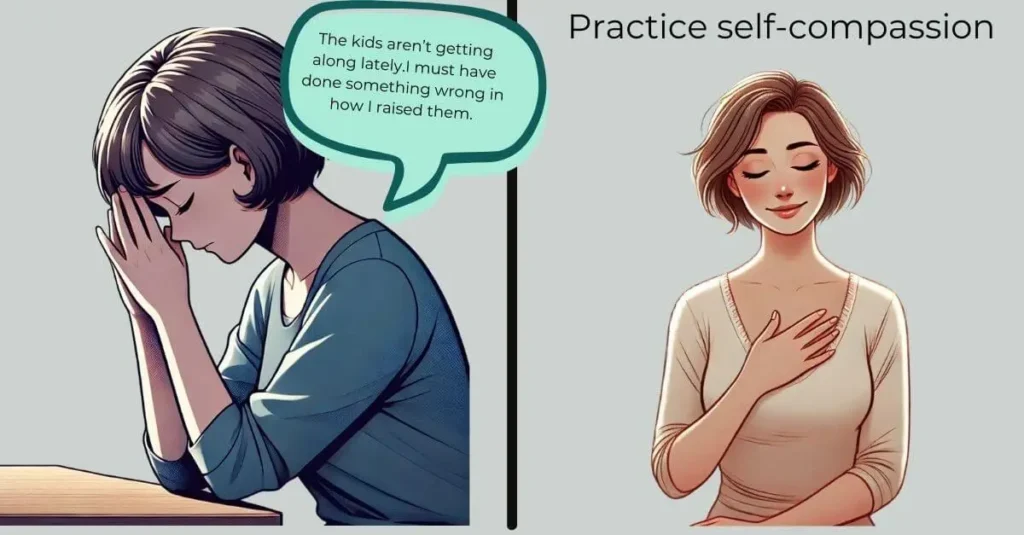
Catastrophizing
Spilled coffee on a new shirt and now busy convincing yourself that the day’s a total disaster?
It’s just a coffee stain, not a coffee apocalypse! Every spill has a story, and hey, sometimes it’s a story with a punchline.
Examples of catastrophizing
- I made a small mistake in my report, and now I am sure I’ll be demoted, which will spiral into financial ruin.
- I forgot to wish my friend a happy birthday on time.She is going to think I am the worst friend ever, and our friendship is basically doomed.
- I stumbled over my words during the presentation. Everyone must think I am completely incompetent, and this is definitely going to derail my entire career.
- I was late to the meeting this morning. My boss is obviously going to think I am unreliable, and let’s be honest, I will probably get fired over this.
Inability to Be Wrong
Clinging to the need to be right at all costs can turn a tiny misstep into a full-blown melodrama.
Let’s lighten up a bit and explore how this stubborn “always right” attitude can lead us down some not-so-merry paths.
A classic case of unjustified ego adding to the negative thought patterns.
Examples of inability to be wrong
- During a friendly trivia night, someone stubbornly argued about the exact year a song was released. Even after someone checked it online, they weren’t backing down. What should have been a fun game turned into a “prove me wrong” showdown.
- When my GPS suggested a quicker route to a new restaurant, my husband scoffed and stuck to the old, familiar path, convinced the GPS knew nothing. Naturally, we arrived 30 minutes late after crossing haunted trees and doomed narrow paths just enough for our car to drive through.
Two examples only for this one, the last one is still triggering me.
Control Fallacies
Think you need to manage every detail of your school reunion? Relax and delegate—it’s not all on you! Trying to control everything only leads to stress, and honestly, a little chaos can add to the charm.
Examples of control fallacies
- Insisting on planning every single activity for the family vacation because you are convinced that without your input, it’ll be a disaster.
- Feeling responsible for making sure your kid’s science project is perfect, only to realize they had more fun (and learned more) when you let them take the lead.
- Trying to micromanage a work project, convinced that if you don’t, it’ll fall apart..
Fairness Fallacies
These sneaky fallacies trick us into believing that life should always be fair, and when it’s not, we find ourselves stuck in another one of negative thought patterns leading to frustration and resentment.
But let’s face it—life’s sense of fairness is about as predictable as a cat’s mood.
Examples of fairness fallacies
- I often go out of my way to accomodate my friends. But they do not seem to be doing that for me.
(As if friendships come with a built-in scoreboard—wouldn’t that be nice?)
- I have sacrificed so much for my family, so they should appreciate me more. It’s not fair that I feel taken for granted.
(Cue the tiny violin playing in the background, while life shrugs and says, “Welcome to adulthood!”)
Life isn’t always fair, but getting stuck on that can turn us into grumpy, fairness-obsessed armchair judges getting triggered and lashing out on social media posts.(Been there done that)
Instead, let’s laugh at the unpredictability, roll with the punches, and remember—sometimes, the best stories come from life’s most unfair moments. Took me several years to get it in my head!
Change Fallacies
Hoping your partner will suddenly share your love for metal rock ? Enjoy your tunes and let them rock their own rhythm. Happiness is harmonious when we appreciate our differences.
Examples of change fallacies
- If my boss would just start recognizing my hard work, I’d finally be satisfied with my job. They must change how they manage the team.
- If my adult children would just visit more often, I’d feel more appreciated and less lonely. They should realise how important this is to me.
- If my friends would stop gossiping and start focusing on more meaningful conversations, I’d enjoy our time together so much more. They must change for our friendship to last.
Change is the only constant thing – for us and for nature. We cannot change others.
Discounting the Positive
A compliment flies your way, and you swat it away like an annoying mosquito. Next time, catch it and tuck it into your confidence cap! Every kind word is a sparkle in your midlife crown.
Learn to appreciate your appreciations – breaking one more negative thought patterns.
Examples of discount the positives
- “You look great today!”—Oh, they’re just being nice. They probably meant, “You don’t look like you just rolled out of bed.”
- “Everyone loved the painting I made.”—Sure, but they’re my friends. They probably think it’s a masterpiece… in the ‘i will not break your heart’ kind of way.
- “My kids turned out well.”—Yeah, but that’s just dumb luck. I am pretty sure they raised themselves, and I just packed their lunchboxes on time.
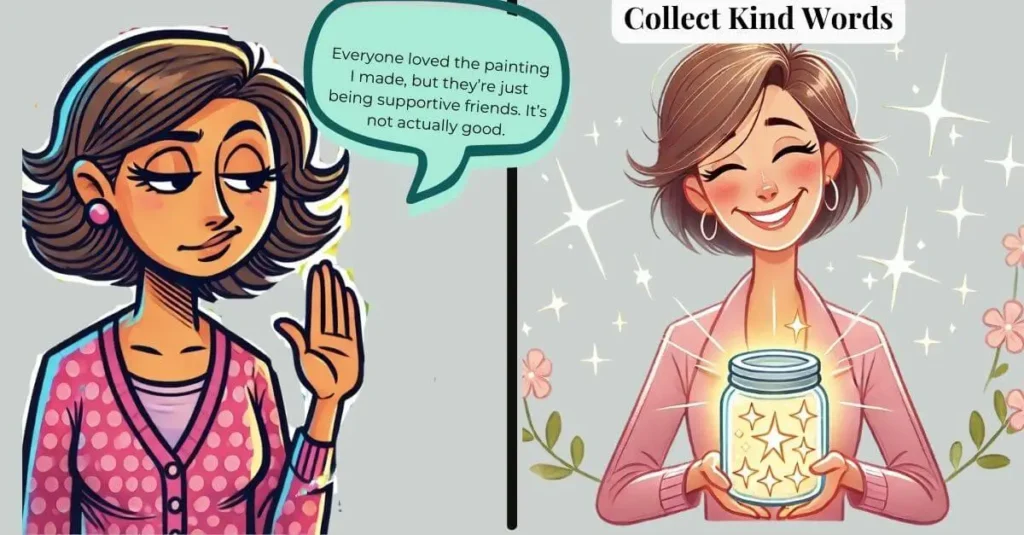
‘‘Shoulds’ or ‘Musts’
This one is a classic! You’ll encounter these little nags a lot in midlife. They are like that overzealous fitness coach or the never-satisfied mother-in-law, always pushing you to meet often unrealistic expectations.
Let us ourselves some slack and celebrate our unique midlife journey. ‘Should’ is just another word for someone else’s story.
Examples of ‘‘shoulds’ or ‘musts’
- I should have a garden that looks like it belongs in a home magazine.(Meanwhile, my plants are holding a survival-of-the-fittest contest.)
- I should be able to do a 5k run without breaking a sweat. Everyone my age is running marathons, and here I am, panting after a few blocks. (If only walking from the couch to the fridge counted as 5k!)
- I must be available for every one of my child’s needs and activities. A good parent wouldn’t miss a single thing. (As if I am supposed to have a clone or two just to keep up.)
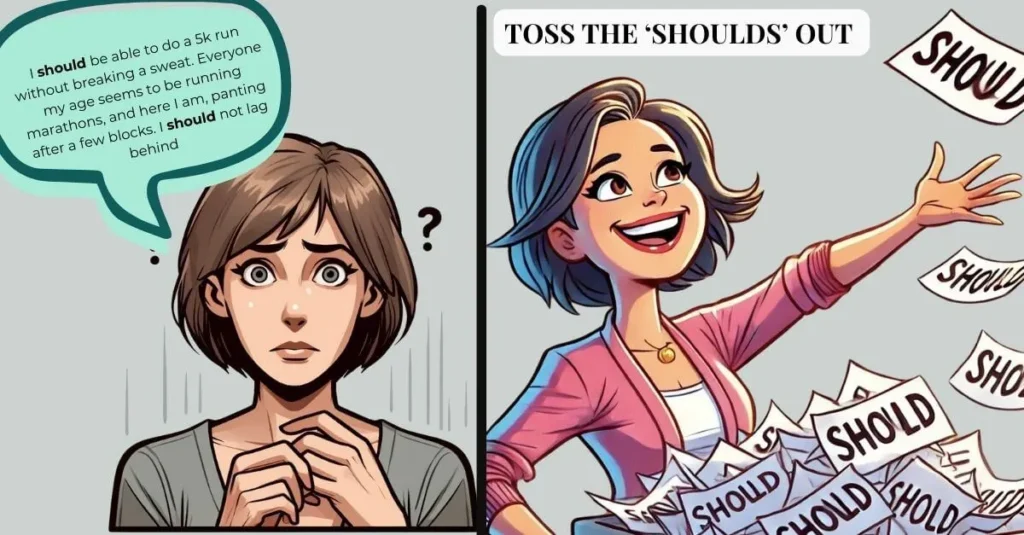
Let’s be real—nobody’s life is as perfect as those “shoulds” make it seem. Embrace your quirks, pace yourself, and remember, midlife isn’t about ticking boxes.
It is about writing your own story.
Conclusion: Embrace the Inner Critic—Just Don’t Let Them Drive
Our minds can play tricks on us.
One moment, we are enjoying a gentle breeze, and the next, we are braving a full-blown cyclone.
The good news?
Now that you’ve met these pesky negative thought patterns, you can start spotting them before they spiral out of control.
I treat self-awareness as my mental GPS. It may not always prevent me from taking the occasional wrong turn, but it sure helps me reroute when I do.


